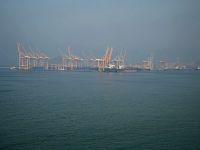Recent falls in international oil prices have triggered a rash of negative prognoses for energy producers in the Gulf. While all Gulf Co-operation Council (GCC) states will face a difficult mix of political and economic challenges in the years ahead, there is reason to believe the situation is not as dire as it is made out to be. GCC states have assiduously diversified their economic and commercial ties in recent years and are more resilient to disruption in any one market. Moreover, their lower production costs underscore the comparative advantage of oil from the Gulf over more recent non-conventional competitors.
Hydraulic fracturing, horizontal drilling, and 3D seismic imaging have opened up enormous new deposits of unconventional energy reserves and the centre of energy gravity is moving westward toward the Americas. That much is clear. What is rather less certain is whether recent breakthroughs in tight oil and shale gas extraction amount to an energy ‘revolution’ or the extent to which they will affect large established players in world energy markets such as Saudi Arabia. Indeed, it is striking how officials in Riyadh and other Gulf capitals express little in the way of anxiety around the developments taking place in the western hemisphere.
Energy experts and public officials in the Gulf states argue that for a combination of economic and technical reasons, the increase in tight oil and shale gas production may be substantially lower than most observers predict. Attention turns to low permeability of tight formations in the US and the rapid and steep declines in productivity of most wells, meaning that large numbers of wells are needed merely to sustain production, let alone expand it. It will also be difficult to replicate elsewhere the ‘uniquely favourable above-ground factors’ - efficient industrial services, infrastructure, legal, and financial systems - that have facilitated the extraction of unconventional energy reserves in North America.
Rapid falls in initial output in the US also throw into sharp relief the contrast with ‘super-giant’ conventional oilfields in the Gulf. Oil production began in the Ghawar and Burgan fields in Saudi Arabia and Kuwait in the late 1940s, immediately after World War Two. Seven decades later, the two fields are still producing large quantities of oil with the inevitable ageing of the fields offset partially by improved geological understanding that facilitates enhanced oil recovery and other techniques designed to lengthen their shelf-life still further. Companies such as Saudi Aramco have invested heavily in upgrading their facilities and, for all the challenges faced by regional economies, remain globally competitive and market leaders in a wide range of derivative industries such as aluminium and petrochemicals.
In addition, pessimistic commentators fail to capture the dynamics of a rapidly-changing global order with multiple centres of economic gravity. The GCC states, led by Saudi Arabia, Qatar, and the UAE, have emerged as key actors in the broader geo-economic rebalancing. The great majority of oil and gas produced in the Gulf now flows east rather than west, and in many cases is locked into long-term gas agreements or, in the case of oil, is being augmented by the formation of strategic oil reserves between producing and consuming states. Gulf-Asia ties have proliferated markedly in the past decade, and the sheer importance of the Gulf as a reliable and stable energy supplier to Pacific Asian economies will not easily be dislodged.
In a very real sense, Gulf economies have already tested the direction of the prevailing winds and adapted course. Strong demand from economies like China and India, even at a slower rate than earlier forecast, will likely keep oil prices at comfortable levels for GCC producers. None of this is to marginalise the important economic challenges that GCC states are already confronting, and the rapidly-rising breakeven price of oil is a genuine and a major dilemma.
Yet it is precisely these issues, rather than the geopolitical implications of the shale revolution, that will be keeping Gulf officials awake at night, and it is how GCC states respond to domestic political and economic challenges, not the shifting vagaries of the global energy landscape, that ultimately will determine whether they end up as ‘winners’ or ‘losers’ in the 21st century reordering.








